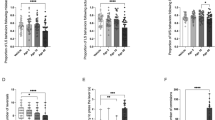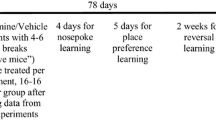Abstract
Two experiments investigated the role of lithium-mediated environmental conditioning on instrumental performance. Experiment 1 demonstrated that a novel taste consumed in one arm of a T maze prior to lithium-induced toxicosis reduced performance in this environment whereas similar aversions conditioned in the home cage failed to alter maze performance. Experiment 2 showed that maze performance in a straight alleyway was decremented during extinction only in a group that actually traversed the alley prior to drinking saccharin and receiving lithium injections. This demonstrated that the instrumental decrement observed in Experiment 1 was due not only to the presence of an unpalatable flavor in the goalbox during the test.
Similar content being viewed by others
References
ADAMS, C. D. (1980). Post-conditioning devaluation of an instrumental reinforcer has no effect on extinction performance. Quarterly Journal of Experimental Psychology, 32, 447–458.
ADAMS, C. D. (1982). Variations in the sensitivity of instrumental responding to reinforcer devaluation. Quarterly Journal of Experimental Psychology, 34, 77–98.
ADAMS, C. D., & DICKINSON, A. (1981a). Instrumental responding following reinforcer devaluation. Quarterly Journal of Experimental Psychology, 33, 109–121.
ADAMS, C. D., & DICKINSON, A. (1981b). Actions and habits: Variations in associative representations during instrumental learning. In N. E. Spear & R. R. Miller (Eds.), Information processing in animals: Memory mechanisms (pp. 143–165). Hillsdale, NJ: Lawrence Erlbaum.
ARCHER, T., SJODEN, P., NILSSON, L., & CARTER. N. (1979). Role of exteroceptive background context in taste-aversion conditioning and extinction. Animal Learning & Behavior, 7, 17–22.
ARCHER, T., SJODEN, P., NILSSON, L., & CARTER, N. (1980). Exteroceptive context in taste-aversion conditioning and extinction: Odour, cage, and bottle stimuli. Quarterly Journal of Experimental Psychology, 32, 197–214.
BARKER, L. M., BEST, M. R., & DOMJAN, M. (Eds.). (1977). Learning mechanisms in food selection. Waco, TX: Baylor University Press.
BEST, M. R., BATSON, J. D., MEACHUM, C. L., BROWN, E. R., & RINGER, M. (1985). Characteristics of taste-mediated environmental potentiation in rats. Learning and Motivation, 16, 190–209.
BEST, M. R., BROWN, E. R., & SOWELL, M. K. (1984). Taste-mediated potentiation of non-ingestional stimuli in rats. Learning and Motivation, 15, 224–258.
BEST, P. J., BEST, M. R., & MICKLEY, S. A. (1973). Conditioned aversion to distinct environmental stimuli resulting from gastrointestinal distress. Journal of Comparative and Physiological Psychology, 85, 250–257.
BRAVEMAN, N. S., & BRONSTEIN, P. (Eds.). (1985). Experimental assessments and clinical applications of conditioned food aversions. New York: Annals of the New York Academy of Sciences, Volume 443.
CHEN, J. S., & AMSEL, A. (1980). Recall (versus recognition) of taste and immunization against aversive taste anticipations based on illness. Science, 209, 851–853.
COLWILL, R. M., & RESCORLA, R. A. (1985a). Postconditioning devaluation of a reinforcer affects instrumental responding. Journal of Experimental Psychology: Animal Behavior Processes, 11, 120–132.
COLWILL, R. M., & RESCORLA, R. A. (1985b). Instrumental responding remains sensitive to reinforcer devaluation after extensive training. Journal of Experimental Psychology: Animal Behavior Processes, 11, 520–536.
DOMJAN, M. (1980). Ingestional aversion learning: Unique and general processes. In J. S. Rosenblatt, R. A. Hinde, C. Beer, & M. Busnel (Eds.), Advances in the study of behavior (Vol. 11). New York: Academic Press.
DOMJAN, M. (1983). Biological constraints on instrumental and classical conditioning 1. years later: Implications for general process theory. In G. H. Bower (Ed.), The psychology of learning and motivation (Vol. 17). New York: Academic Press.
DOMJAN, M., & WILSON, N. E. (1972). Specificity of cue to consequence in avoidance learning in the rat. Psychonomic Science, 26, 143–145.
GARCIA, J., & KOELLING, R. A. (1966). Relation of cue to consequence in avoidance learning. Psychonomic Science, 4, 123–124.
GARCIA, J., KOVNER, R., & GREEN, K. F. (1970). Cue properties vs payability of flavors in avoidance learning. Psychonomic Science, 20, 313–314.
HOLMAN, E. W. (1975). Some conditions for dissociation of consummatory and instrumental behavior in rats. Learning and Motivation, 6, 358–366.
KLEIN, S. B., FREDA, J. S., & MIKULKA, P. J. (1985). The influence of a taste cue on an environmental aversion: Potentiation or overshadowing. The Psychological Record, 35, 101–112.
MORRISON, G. R., & COLLYER, R. (1974). Taste-mediated aversion to an exteroceptive stimulus following LiCI poisoning. Journal of Comparative and Physiological Psychology, 86, 51–55.
REVUSKY, S., & PARKER, L. A. (1976). Aversions to unflavored water and cup drinking produced by delayed sickness. Journal of Experimental Psychology: Animal Behavior Processes, 2, 342–353.
SJODEN, P., & ARCHER, T. (1983). Potentiation of a bottle aversion in compound conditioning with rats. Experimental Animal Behavior, 2, 1–18.
WILSON, C. L., SHERMAN, J. E., & HOLMAN, E. W. (1981). An aversion to the reinforcer differentially affects conditioned reinforcement and instrumental responding. Journal of Experimental Psychology: Animal Behavior Processes, 7, 165–174.
Author information
Authors and Affiliations
Rights and permissions
About this article
Cite this article
Best, M.R., Meachum, C.L., Davis, S.F. et al. The Effects of Flavor-Aversion Learning on Instrumental Performance. Psychol Rec 37, 43–54 (1987). https://doi.org/10.1007/BF03395872
Published:
Issue Date:
DOI: https://doi.org/10.1007/BF03395872




